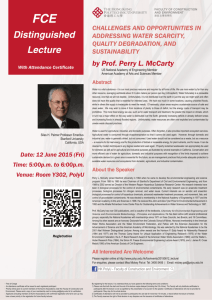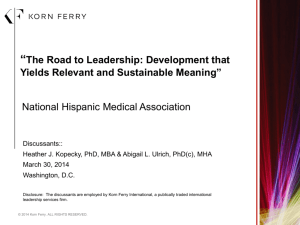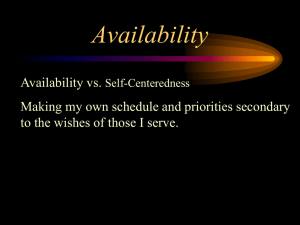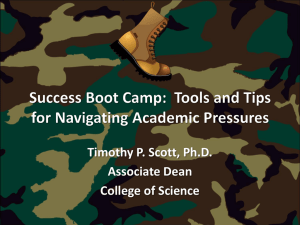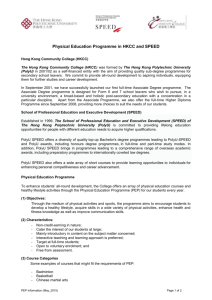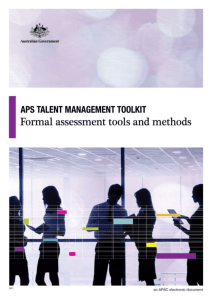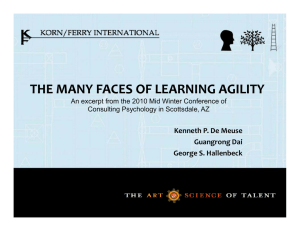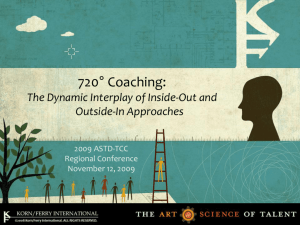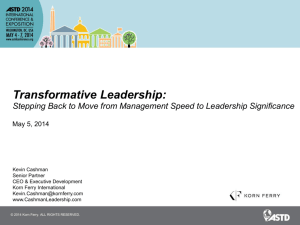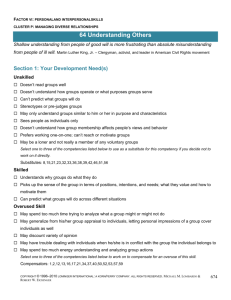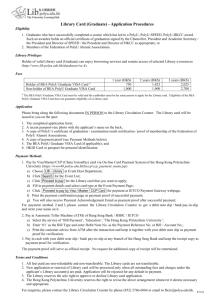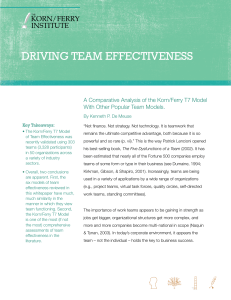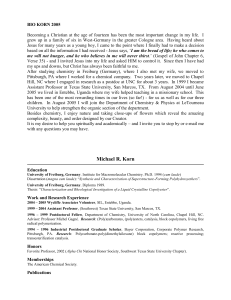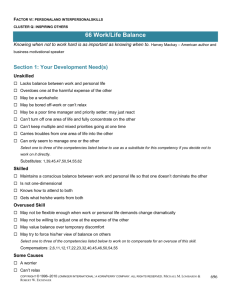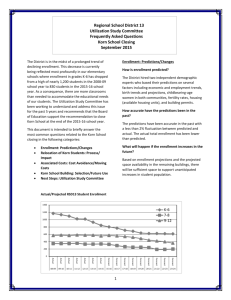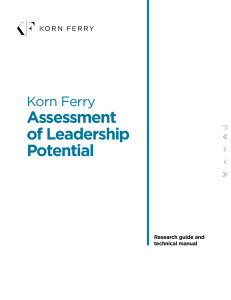Leading Self
advertisement
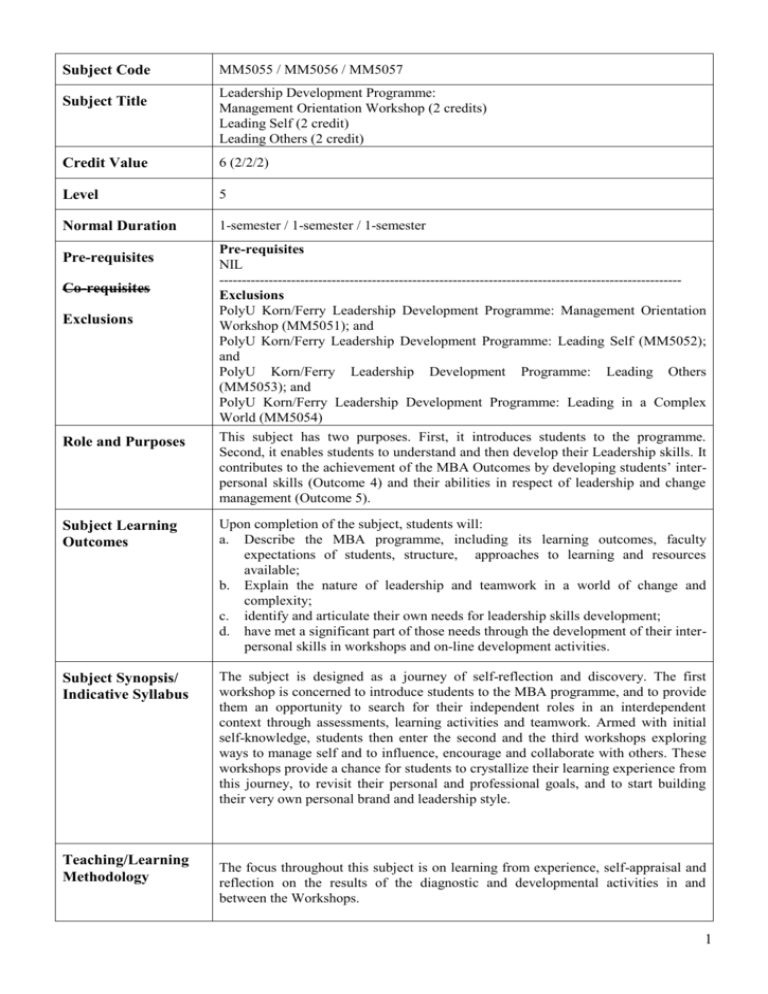
Subject Code Subject Title MM5055 / MM5056 / MM5057 Leadership Development Programme: Management Orientation Workshop (2 credits) Leading Self (2 credit) Leading Others (2 credit) Credit Value 6 (2/2/2) Level 5 Normal Duration 1-semester / 1-semester / 1-semester Pre-requisites Co-requisites Exclusions Role and Purposes Pre-requisites NIL ------------------------------------------------------------------------------------------------------Exclusions PolyU Korn/Ferry Leadership Development Programme: Management Orientation Workshop (MM5051); and PolyU Korn/Ferry Leadership Development Programme: Leading Self (MM5052); and PolyU Korn/Ferry Leadership Development Programme: Leading Others (MM5053); and PolyU Korn/Ferry Leadership Development Programme: Leading in a Complex World (MM5054) This subject has two purposes. First, it introduces students to the programme. Second, it enables students to understand and then develop their Leadership skills. It contributes to the achievement of the MBA Outcomes by developing students’ interpersonal skills (Outcome 4) and their abilities in respect of leadership and change management (Outcome 5). Subject Learning Outcomes Upon completion of the subject, students will: a. Describe the MBA programme, including its learning outcomes, faculty expectations of students, structure, approaches to learning and resources available; b. Explain the nature of leadership and teamwork in a world of change and complexity; c. identify and articulate their own needs for leadership skills development; d. have met a significant part of those needs through the development of their interpersonal skills in workshops and on-line development activities. Subject Synopsis/ Indicative Syllabus The subject is designed as a journey of self-reflection and discovery. The first workshop is concerned to introduce students to the MBA programme, and to provide them an opportunity to search for their independent roles in an interdependent context through assessments, learning activities and teamwork. Armed with initial self-knowledge, students then enter the second and the third workshops exploring ways to manage self and to influence, encourage and collaborate with others. These workshops provide a chance for students to crystallize their learning experience from this journey, to revisit their personal and professional goals, and to start building their very own personal brand and leadership style. Teaching/Learning Methodology The focus throughout this subject is on learning from experience, self-appraisal and reflection on the results of the diagnostic and developmental activities in and between the Workshops. 1 Assessment Methods in Alignment with Intended Learning Outcomes Specific assessment methods/tasks % weighting Intended subject learning outcomes to be assessed (Please tick as appropriate) a. Continuous Assessment* c. d. 100% 1. Management Orientation Workshop : quiz and self-appraisal on MBA structure and expectations, and learning styles# 2. In-workshop exercise requiring effective teamwork# 3. Self-appraisal of initial leadership diagnostics 20% 4. Individual reflection on the impact of the LDP 80% Total b. 100 % # These assessments are formative only, involving immediate feedback to students in the workshop setting. To pass this subject, students are required to obtain Pass in the Continuous Assessment components. Explanation of the appropriateness of the assessment methods in assessing the intended learning outcomes: Initial self-appraisal followed by post-development reflection is the most appropriate way for students to demonstrate that the learning outcomes for this subject have been met. Student Study Effort Expected Class contact: Management Orientation Workshop 20 Hrs. Leading Self Workshop 16 Hrs. Leading Others Workshop 16 Hrs. Online development activities and Self study Total student study effort Reading List References and 182 Hrs. 234 Hrs. Covey, S.R. (1989). The 7 habits of highly effective people. Free Press. Day, D. V. (2000). Leadership development: A review in context. Leadership Quarterly, 11 (14), 581-613. Conger, J.A. (2004). Developing leadership capability: What’s inside the black box? Academy of Management Executive, 18(3), 136-139. Das, D. K. (2013). Management education in Asia: an invigorating growth. 2 Asia Pacific Business Review, 19(3), 421-425. Lawler III, E. E. (1994). From job-based to competency-based organizations. Journal of Organizational Behavior, 15(1), 3-15. Mabey, C. (in press). What kind of leader are you becoming? Sage publication. Grugulis, I. (2007) Skills, Training and Human Resource Development: A Critical Text. Hui, P. Chiu, W., Coombes, & Pang, E. (in press). Do business schools prepare students for cosmopolitan careers? The case of Greater China, Sage Publication. McCall, M.W. Jr. (2005). Leadership development through experience. Academy of Management Executive, 18(3), 127-130. Pfeffer, J., & Fong, C. T. (2002). The end of business schools? Less success than meets the eye. Academy of Management Learning & Education, 1(1), 78 95. Schyns, B., Kiefer, T., Kerschreiter, R., & Tymon, A. (2011). Teaching implicit leadership theories to develop leaders and leadership: How and why it can make a difference. Academy of Management Learning & Education, 10(3), 397-408. Shippmann, J. S., Ash, R. A., Battista, M., Carr, L., Eyde, L. D., Hesketh, B., Kehoe, J., Pearlman, K., Prien, E. P. & Sanchez, J. I. (2000). The practice of competency modeling. Personnel Psychology, 53(3), 703-740. Useem, M., (2010). Four lessons in adaptive leadership. Harvard Business Review, November, 87-90. 3
